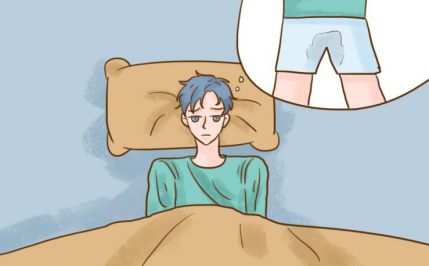Nocturnal Emission
Request an appointment

Overview
A wet dream is a spontaneous orgasm during sleep that is typically associated with erotic images and thoughts. These so-called nocturnal emissions can also happen because of hormone levels and even light stimulation of the genitals.
People of all sexes who have gone through puberty can experience wet dreams, though they are most common in the teen years. They don’t happen to everyone but are a perfectly normal occurrence.
This article explains what happens during wet dreams and what causes them. It also provides tips for how to stop wet dreams and how to clean semen from your sheets.

What Happens During a Wet Dream?
For males, a wet dream is accompanied by the propulsive release of semen (ejaculation).1 In females, there may be a release of clear fluid from the urethra (the tube through which urine normally exits the body) during the orgasm.
Sometimes, a person may only realize that they’ve had a wet dream when their bed sheets or undergarments are moist with semen or vaginal fluid.
At other times, an orgasm during a wet dream can be intense enough to awaken a person.
Ages When Wet Dreams Start and Stop
Wet dreams can start at age 13 or 14.4 Around 38% of teenage males experience a wet dream before learning what it even is.5
Nocturnal emissions are more common during the teenage years because sex hormones are surging. They are also more common during periods of prolonged sexual abstinence. Wet dreams tend to occur less frequently with age but do continue beyond puberty.
Not everyone experiences a wet dream. A survey of more than a thousand males and more than a thousand females revealed that 66% and 42% of them, respectively, had experienced at least one wet dream.6
What Causes a Wet Dream?
During sleep, the blood flow to your sexual organs may be increased. For males, this can lead to an erection (“hard-on”). This is the common cause of “morning wood” in which you awaken with an erection, typically without ejaculation but sometimes with pre-seminal fluid (“pre-cum”).
Nocturnal emissions differ in that orgasm occurs during a wet dream. The underlying cause is unknown but there are several theories. Among them:1
- Erotic dreams: Erotic dreams may lead to orgasm for some people, though they’re not a prerequisite.
- Testosterone surge in teens: Wet dreams are linked to high testosterone levels. Testosterone, the primary sex hormone in males, will surge during the teen years right up until early adulthood.
- Stimulation of the genitals: It is possible that the rubbing of the genitals during sleep (such as with bed sheets or lying on your stomach) can cause unintended sexual stimulation. This might contribute to the likelihood of a wet dream.
Wet dreams have also been linked to watching TV. One study found that teenage males who watched more than three hours of television a day had more frequent wet dreams.7
The cause of nocturnal emission in females is less clear, in part because female wet dreams are harder to identify due to the lack of ejaculation.
How to Stop Having Wet Dreams
Wet dreams are normal, but some people believe there are a few ways to reduce how often wet dreams occur. One way is to have more sex or engage in more frequent masturbation that ends with orgasm and ejaculation. This may relieve the need for males to ejaculate during sleep.
Reducing contact with the genitals might also be helpful. Try sleeping on your side or back instead of your stomach to see if it helps. You can also try wearing pajama bottoms instead of sleeping in the nude.
In the rare cases that wet dreams are troublesome, a doctor might prescribe a medication such as an antidepressant. These medicines might reduce the frequency of wet dreams, but they might also make it hard for males to ejaculate when awake.8
What to Do If You Have a Wet Dream
Typically, you’ll need to clean your sheets or clothing that became wet from semen or vaginal fluids.
If the stain is fresh, rinse the area with cold water before washing normally. For older stains, use a soft brush to scrub away any crust. Then blot the stain with a product containing enzymes before washing normally.
If your sheets are wool or silk, you can mix lukewarm water and a mild detergent before washing.9
Summary
Wet dreams occur when you ejaculate while sleeping, sometimes as a response to sexual dreams. They mostly happen to teenage males or people going through periods of abstinence, but they can occur in females and older people, too.
Wet dreams can be a healthy and normal part of sleep. Aside from the need to clean up clothing or bedding, there’s no particular problem with them. Talk to your healthcare provider if you have concerns or questions about your wet dreams.

Diagnosis
Nocturnal emissions
Nocturnal emissions, also known as “wet dreams,” are most common during adolescence and sometimes into a man’s 20s. Most men have nocturnal emissions at some point in their lives.
A nocturnal emission is an involuntary ejaculation of semen that occurs when you’re sleeping. It can happen if your genitals become stimulated from bedsheets or during a sexual dream. A wet dream may result in some semen leakage, rather than a full ejaculation.
In any event, nocturnal emissions are quite common once a boy hits puberty.
Treatment
Most men and boys don’t need any treatment for nocturnal emissions. They usually become less frequent as you move into your 20s. They may be more frequent, however, during periods in which you’re having less sexual intercourse or are masturbating less often.
Increased sexual activity may lead to a decrease in nocturnal emissions. If you have questions about nocturnal emissions, talk with your doctor.
Medication side effects
Medications, such as antidepressants, mood stabilizers, and some hormone treatments may also cause semen leakage.
SSRIs, a group of antidepressants, can be associated with semen leakage and other sexual side effects. These other effects include:
- low libido (reduced sex drive)
- delayed ejaculation
- erectile dysfunction
These side effects will depend on the type of SSRI, its dosage, and its combination with other medications. If you’re on one of these medications, you should weigh the pros and cons of taking these drugs and their side effects.
Treatment
When it comes to treating depression, the current recommendations state that both psychotherapy and medication are effective choices. Between 30-40 percent of people may improve with just one of these treatments — either just psychotherapy, or just medication. However, a combination of both is believed to be most effective.
If these sexual side effects outweigh the benefits of your current antidepressant medication, you should talk with your doctor. In some cases, adjusting the dosage of a medication or switching to a different class of drug may be enough to resolve any side effects. You can also ask them about behavioral therapies that may help.
You should never stop taking an SSRI or other antidepressant without talking to your doctor first. If you have questions about the short- and long-term effects of a particular medication, bring up your concerns with your doctor and find out your options. You can also discuss any alternative treatments that may be possible for you.
Prostate problems
Your prostate is the gland that produces semen to help carry your sperm through your urethra and out of your penis. Your prostate is vulnerable to a number of health problems. Among these problems are prostatitis and prostate cancer.
Prostatitis is an inflammation and enlargement of the prostate. It can be caused by:
- a bacterial infection
- any substance that triggers an immune response and inflammation
- a nerve injury
It’s less clear why prostate cancer develops. However, certain genetic changes seem to Trusted Source play an important role. Like prostatitis, prostate cancer can cause:
- difficulty urinating
- pain in the pelvic area
- changes in ejaculation
- blood in semen
These prostate problems may also lead to other symptoms, including semen leakage.
Treatment
If you experience any of the below symptoms, you should see a doctor:
- a burning sensation while urinating
- blood in your urine or semen
- changes in ejaculation
- painful ejaculation
A course of antibiotics may be needed to treat prostatitis caused by a bacterial infection.
Prostate cancer is a much more complicated condition to treat. Because prostate cancer is usually slow-growing, no treatment may be recommended at first. An approach known as “active surveillance” includes regular checkups and tests to see if the cancer is progressing.
Surgery to remove the prostate and other treatment options may also be recommended by your doctor. Treatments can vary in their effectiveness and side effects depending on the stage of the cancer.
Injury to the nervous system
When an injury to your nervous system occurs, you may also experience changes in ejaculation, leading to semen leakage. Advanced age, infections, and injuries and surgery to the spinal cord or groin may affect the nerves involved in ejaculation.
Complex interactions between the brain, spinal cord, and nerves must occur in order for ejaculation to happen. Medical conditions that affect nerves, such as diabetes, stroke, or multiple sclerosis, can change sexual function and ejaculation.
Treatment
Treating the underlying cause is the best chance for improvement. Nerve injury from inflammation or infection may get better over time. While nerve damage related to surgery, cancer treatment, or nervous system diseases may be much harder to treat.
Your healthcare team can work with you to create an overall treatment plan that’s right for you.

Doctors who treat this condition

Dr. Bala
Best Sexologist In Kolkata




